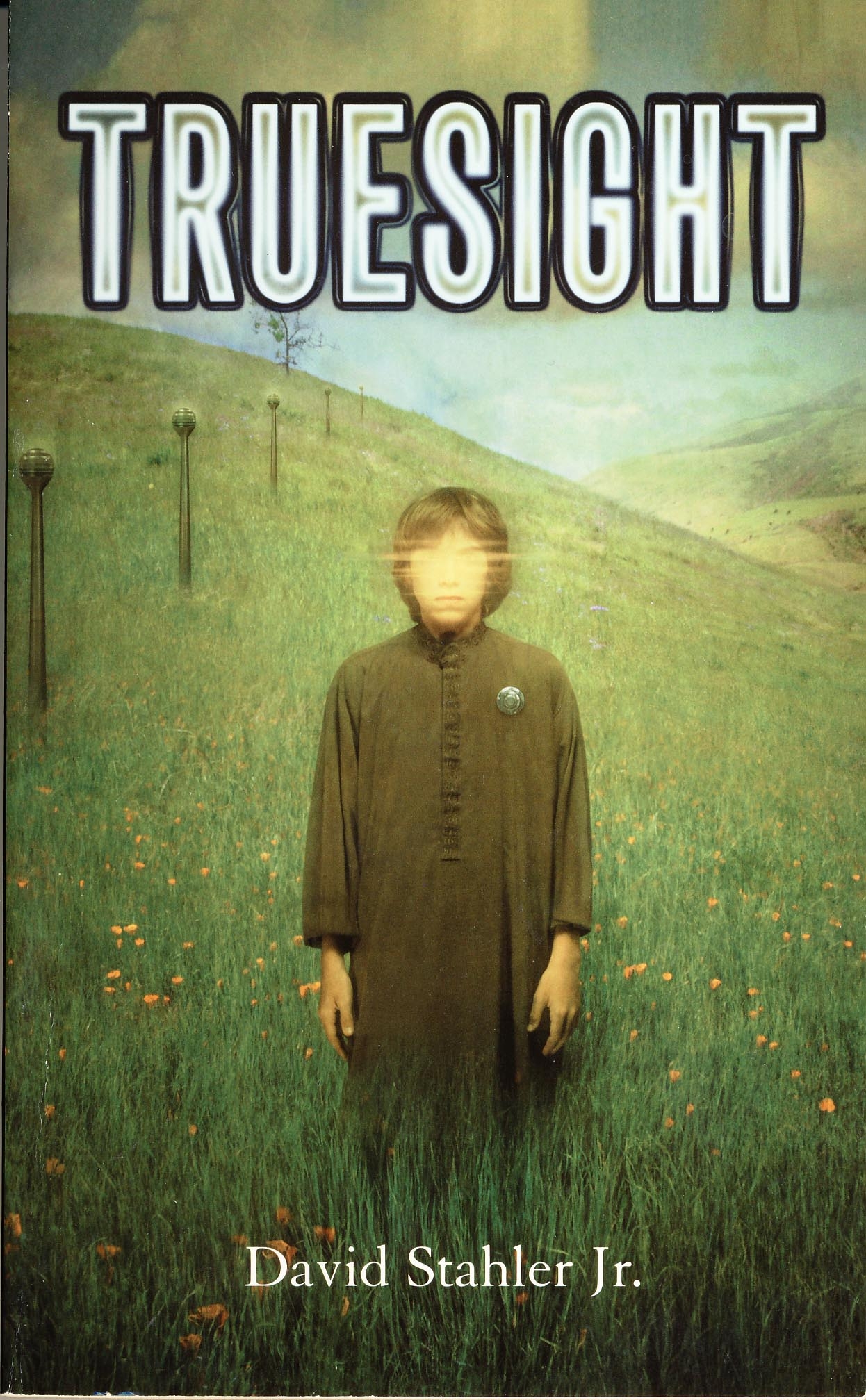LITR 4632: Literature of
the Future

Student Future-Visions Presentation 2007
Thursday, 28 June: Future-vision presenter: Laura Moran
David Stahler, Jr., Truesight.
New York: HarperCollins Publishers, 2004.
“A world where genetic engineering has taken a startling turn…”
Primary objectives:
1. To identify, describe and criticize stories humans tell about the future
- Apocalyptic
- Evolutionary
- Alternative
2. To identify, describe and criticize typical visions or scenarios of the future
A. Utopia and/or Dystopia – is everyone happy here?
B. High tech and low tech – High tech genetics modifications, yet low tech farming and rationing of food, supplies.
Summary:
Everyone in Jacob’s community is born blind and live in Harmony (literally, the name of the village is Harmony). Things have always been this way. The people who live in Harmony embrace the philosophy of Truesight: Blindness brings unity, purity and freedom. It is an exceptional community. Everyone is happy. As Jacob approaches his thirteenth birthday, he anxiously anticipates his new role as an adult and all the changes that will bring. But as the day approaches, a far greater change threatens Jacob’s future. It all starts with a searing pain in his eyes…
This book is the first of a trilogy. (Takes place sometime after 2093) The second book, The Seer, is now complete.
The village and the genetic engineering to make its residents blind began with a gathering of blind couples in the early twenty-first century. Bioengineering was becoming standard practice among expectant couples on Earth and these couples decided that they wanted their children to be born like them. Eventually the group left Earth because of continual battles over territory and trading rights, crimes committed against one another and betrayals created by the seeing world (Seers). Once Jacob asks his teacher if all Seers are bad and she replies, “No, Jacob. They’re not all that bad. But even the best of them are limited by their arrogance, by their search for ease in life, by their obsession with material things. They think they know the answers, but in their own way they are the ones who are truly blind. (Leaving Earth – apocalyptic events)
While all seems like a Utopian lifestyle on the surface, Jacob begins to notice that not all people in Harmony are happy. The daughter of the high councilor attempts to run away and Jacob overhears his own father express distaste for his appointed job (grower) Jacob begins to resent the idea that his future will be decided by someone other than himself.
Excerpts:
Jacob overhears the high councilor speaks to his rebellious daughter, Delaney. “No one leaves Harmony, “ said the deep voice of the high councilor. “No one’s ever left.” There was a pause. “Why do you want to leave, Delaney? You have everything here. People who love you, a promising career. You know what’s out there? Nothing. Garbage, violence, hate, shallow people leading shallow lives, never knowing their depths.”….”You’re depressed, desperate. We’ll take care of you, prescribe something so you’ll feel better.”
Delaney answers her father. “Stop telling me what I am.” She was crying now. Jacob could hear her sobbing quietly. After a moment she whispered, “Father, I want to see.”
Utopia
This part of the Gathering Jacob had always loved. He found comfort in the anonymous bodies of those around him, liked the loss of self that accompanied his own anonymity. He liked being part of something bigger than himself, adding his own sound to the music of the hive.”
Telling his best friend, Egan, about his newfound sight.
“I can’t explain it,” he said. “It’s as if everything about yourself is suddenly bigger and smaller at the same time The whole world is bigger because you can see the distances. The sun rises and sets, and the moon climbs too, across your eyes. You realize you’re nothing in the midst of the world out there. When I was blind, I had only myself, not even the sounds that defined the space around me. I was inside. Now I’m still in there, but I’m surrounded by everything”
His sight leads to him knowing negative things about the village and his family. Thievery, adultery and subtle facial expressions people use to communicate. His parents use these facial expressions and only he can see them, leading him to wonder if people ever communicate honestly with each other at all, not being able to see these expressions.
His friend tells the authorities that Jacob can see, they attempt to “fix” him and he runs away. To be continued in the sequel….
Questions:
- Even though all the people in
Harmony are blind, they are not equal. How does a society that prides itself
on the unity of its people decide who holds the power. Why don’t the
“have-nots” rise up and demand equal treatment? There are certainly more
disgruntled folk than happy citizens and they are increasingly unhappy as
time goes by.
- Do you think blindness keeps the
villagers from communicating with one another? How so?
- Planning a village of blind followers may seem a little far-fetched. Can you think of any other types of bioengineering might actually be used at any point in the future to produce a utopian-type community?
